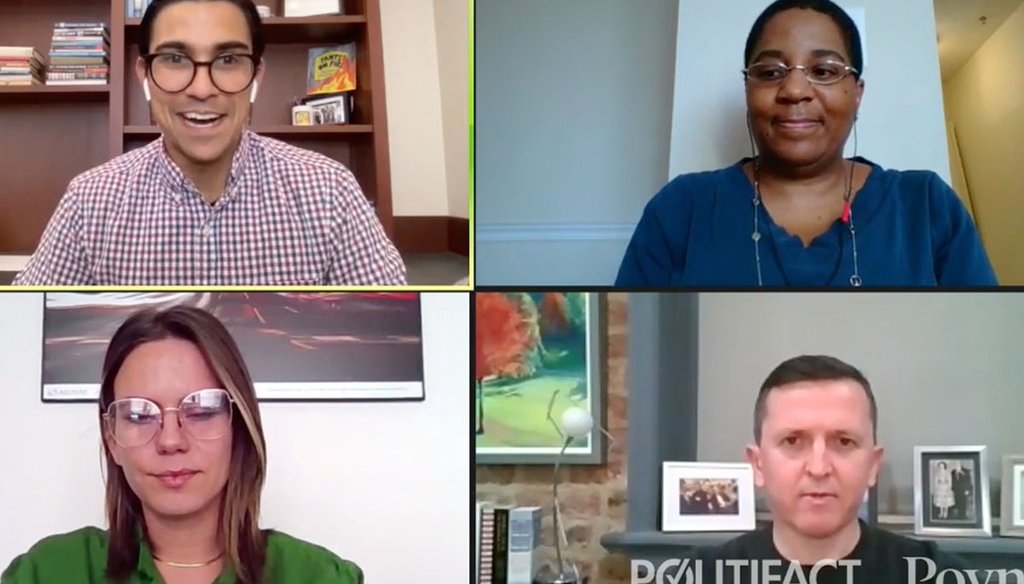Stand up for the facts!
Our only agenda is to publish the truth so you can be an informed participant in democracy.
We need your help.
I would like to contribute

MediaWise Director Alex Mahadevan, top left, discusses misinformation with (clockwise from top right) Martina Stewart, Arthur MacMillan and Christina Anagnostopoulos.
Amid the devastation of Hurricane Ian, which brought record winds and record storm surges, one light moment stood out for fact-checkers: Was there really a shark swimming in the streets?
Although the jury’s still out on this most recent example (credible sources offer conflicting views), several past hoaxes involving hurricanes, and sharks where they’re not supposed to be, have been debunked.
On Sept. 29, Mediawise Director Alex Mahadevan interviewed three expert fact-checkers with Reuters, USA Today and Agence France-Presse for United Facts of America’s last panel discussion. The panelists, Christina Anagnostopoulos, Arthur MacMillan and Martina Stewart, discussed misinformation, present and future, and the limits of fact-checking. Sharks in the streets came up, too.
Stewart, senior editor of USA Today’s fact-checking team, said one topic of misinformation appearing with increasing frequency is political misinformation from the left targeting the right.
"The thing that I've seen a lot of that I'm really concerned about, actually, is misinformation about prominent Republicans or conservatives emanating from sources on the left," Stewart said. "We’re seeing a lot of that and I am deeply concerned and troubled about what it means going into the midterms that sources on the left are now engaging in misinformation."
Stewart also said that although her team has not yet encountered many real deepfakes — manipulated videos that yield seemingly realistic, but fabricated, images and sounds — the next wave of online misinformation will be primarily visual.
"There are a couple of categories there. There’s out-of-context media, where the audio, image or video itself hasn’t been altered, but a new story is being put around it," Stewart said. "The next category is what we would call altered, where the image, video or audio has been clipped or changed in some way. I think those things are the things to really be concerned about now."
MacMillan, head of U.S. digital investigation at Agence France-Presse, said his team also was seeing a lot of out-of-context visual media presented as misinformation. He cited a years-old video of broadcast journalist Shepard Smith that was contextualized to make it look as if he was talking about Hurricane Ian.
"It had been shared half a million times by yesterday despite us doing the story saying this is not accurate," MacMillan said. "It was being presented as this was about Hurricane Ian. It wasn’t. It was six years out of date. But people fall for it and they share it."
Christina Anagnostopoulos, head of U.S. fact-checking at Reuters, agreed that deepfakes are not yet a pressing issue in fact-checking so far.
"The deepfake risk just hasn't been as harmful at scale as we initially thought it might be," Anagnostopoulos said. "It’s more that low-tech tweet that’s been photoshopped, or it’s a video that might have been slightly edited or the sound has been edited; it’s not deepfakes."
Mahadevan also asked the panel about fact-checking’s limits, highlighting the lack of resources in the space.
"Even with the amount of people and resources that are available, you can’t do everything. What can we do to go beyond fact-checking?" Mahadevan said.
Anagnostopoulos highlighted the need for increased media literacy education.
"I think it’s important to teach folks some basic research skills, open source, analytical and critical thinking skills," Anagnostopoulos said. "Just returning into our culture notions of information quality. Just because some crazy site pops up on the top of your Google search doesn’t mean it’s the first thing you should click on."
Our Sources
See links in story.













